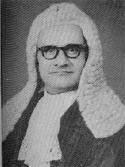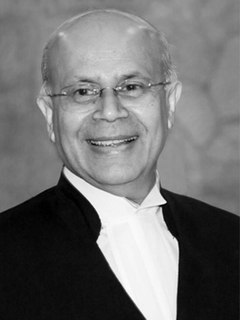Related Research Articles

Rajendra Prasad was an Indian independence activist, lawyer, scholar and subsequently, the first president of India, in office from 1950 to 1962. He was an Indian political leader & he joined the Indian National Congress during the Indian Independence Movement and became a major leader from the region of Bihar and Maharashtra. A supporter of Mahatma Gandhi, Prasad was imprisoned by British authorities during the Salt Satyagraha of 1931 and the Quit India movement of 1942. After the constituent assembly 1946 elections, Prasad served as Minister of Food and Agriculture in the central government. Upon independence in 1947, Prasad was elected as President of the Constituent Assembly of India, which prepared the Constitution of India and served as its provisional Parliament.

The Solicitor General of India is subordinate to the Attorney General for India. They are the second law officer of the country, assists the Attorney General, and is assisted by Additional Solicitors General for India. Currently, the Solicitor General of India is Tushar Mehta. Like the Attorney General for India, the Solicitor General and the Additional Solicitors General advise the Government and appear on behalf of the Union of India in terms of the Law Officers Rules, 1972. However, unlike the post of Attorney General for India, which is a Constitutional post under Article 76 of the Constitution of India, the posts of the Solicitor General and the Additional Solicitors General are merely statutory. Appointments Committee of the Cabinet (ACC) recommends the appointment and officially appoints the Solicitor General. The proposal for appointment of Solicitor General, Additional Solicitor General is generally moved at the level of Joint secretary/Law Secretary in the Department of Legal Affairs and after obtaining the approval of the Minister of Law & Justice, the proposal goes to the ACC and then to the president.

Shri Krishna Sinha, also known as Shri Babu, was the first chief minister of the Indian state of Bihar (1946–61). Except for the period of World War II, Sinha was the chief minister of Bihar from the time of the first Congress Ministry in 1937 until his death in 1961. Along with the Desh Ratna Rajendra Prasad and Bihar Vibhuti Anugrah Narayan Sinha, Sinha is regarded among the 'Architects of Modern Bihar'. He also led the Dalit entry into the Baidyanath Dham temple, which reflected his commitment towards the upliftment and social empowerment of the Dalits. He was the first chief minister in the country to abolish the zamindari system. He underwent different terms of imprisonment for a total of about eight years in British India. Sinha's mass meetings brought hordes of people to hear him. He was known as Bihar Kesari for his lionlike roars when he rose to address the masses. His close friend and eminent Gandhian Bihar Vibhuti A.N. Sinha in his essay Mere Shri Babu wrote that, "Since 1921, the History of Bihar has been the history of the life of Shri Babu".

Soli Jehangir Sorabjee, AM was an Indian jurist who served as Attorney-General for India from 1989 to 1990, and again from 1998 to 2004. In 2002, he received the Padma Vibhushan for his defence of the freedom of expression and the protection of human rights.

Neal Kumar Katyal is an American lawyer and academic. He is a partner at Hogan Lovells and the Paul and Patricia Saunders Professor of National Security Law at Georgetown University Law Center. During the Obama administration, Katyal served as Acting Solicitor General of the United States from May 2010 until June 2011. Previously, Katyal served as an attorney in the Solicitor General's office, and as Principal Deputy Solicitor General in the U.S. Justice Department. He is currently a partner of Chamath Palihapitiya Social+capital Partnership and a member of the board of Social Capital Ventures Inc.
Satyendra Narayan Sinha was an Indian politician and statesman, participant in the Indian independence movement, a leading light of Jaya Prakash Narayan's ‘complete revolution’ movement during the Emergency and a former Chief Minister of Bihar. Affectionately called Chhote Saheb, he was also a seven-time Member of Parliament from the Aurangabad constituency, a three-term Member of the Bihar Legislative Assembly, and a Member of the Bihar Legislative Council once. Regarded to be one of India's most influential regional people of the time, his reputation was synonymous with being a strict disciplinarian and tough taskmaster.

Dr. Anugrah Narayan Sinha, known as Bihar Vibhuti, was an Indian nationalist statesman, participant in Champaran Satyagraha, Gandhian & one of the architects of modern Bihar, who was the first Deputy Chief Minister and the Finance Minister of the Indian state of Bihar (1946–1957). He was also a Member of the Constituent Assembly of India, which was elected to write the Constitution of India and served in its first Parliament as an independent nation. He also held a range of portfolios including Labour, Local Self Government, Public Works, Supply & Price Control, Health and Agriculture. A.N. Sinha, affectionately called Anugrah Babu, was a very close associate of Mahatma Gandhi during the freedom struggle movement and worked with Bihar Kesari Dr. Sri Krishna Sinha to lead the Gandhian movement in Bihar One of the leading nationalists in the Indian independence movement from Bihar after Dr Rajendra Prasad, he was elected as the Congress Party deputy leader in the state assembly to assume office as first Deputy Chief Minister cum Finance Minister of independent Bihar, and re-elected when the Congress Party won Bihar's first general election with a massive mandate in 1952.

Ashwani Kumar is an Indian politician and attorney who formerly served as Member of Parliament, Rajya Sabha representing the state of Punjab. He formerly served as Union Minister of Law and Justice and Union Minister of State in the Department of Industrial Policy and Promotion and Ministry of Commerce and Industry.
Barbara Dale Underwood is an American lawyer currently serving as the Solicitor General of New York. She was first appointed to the position in January 2007 by Andrew Cuomo, who was then serving as the state's Attorney General. Underwood was reappointed in 2011 by Attorney General Eric Schneiderman.
The Government of Bihar, known locally as the State Government, is the supreme governing authority of the Indian state of Bihar and its 9 divisions which consist of 38 districts. It consists of an executive, led by the Governor of Bihar, a judiciary and legislative branches.

Bhuvaneshwar Prasad Sinha of Shahabad, Bihar was the 6th Chief Justice of India. He also served as the president of the Bharat Scouts and Guides from April 1965 to February 1967. Mr. Sinha was born and brought up in a prominent upper cast hindu Rajput family of Village Gajiyapur, Sinha Arrah District. His grandson B. P. Singh is a former judge of the Supreme Court of India.
Indradeep Sinha was an Indian freedom fighter and veteran communist leader.

Lalit Mohan Sharma was the 24th Chief Justice of India. He was the son of L.N. Sinha, former Attorney General of India. He served as Chief Justice of India from 18 November 1992 until 11 February 1993.
Satya Brata Sinha, known as S. B. Sinha was a jurist and a former judge of the Supreme Court of India.
John J. Bursch was the 10th Michigan Solicitor General. He was appointed by Michigan Attorney General Bill Schuette on February 28, 2011. Prior to being Michigan Solicitor General, Bursch served as chair of the Appellate Practice and Public-Affairs Litigation Groups at Warner Norcross & Judd. Bursch argued in more than 6% of all the cases the U.S. Supreme Court heard during his tenure as Solicitor General. Bursch returned to private practice at Warner Norcross & Judd in December 2013, and founded his own law firm in 2016, Bursch Law.

Patna College, established in 1863 during the British Raj, is one of the oldest colleges in the state of Bihar, India. It offers undergraduate and postgraduate courses in science, arts and commerce as well as some vocational courses like BBA, BMC and BCA. The college is affiliated to Patna University. It is also considered to be the oldest institution of higher education in Bihar.
Deshamanya Justice Victor Tennekoon QC was a Sri Lankan lawyer and jurist. He served as the 35th Chief Justice of Sri Lanka, as well as the 33rd Attorney General and 23rd Solicitor General. From 1979 to 1984 Tennekoon served as Chancellor of the University of Peradeniya.
Mukul Rohatgi is an Indian lawyer and designated senior counsel, and was the 14th Attorney General for India. He was succeeded by K. K. Venugopal. He had a tenure of three years as Attorney General, from 19 June 2014 to 18 June 2017. He is a senior advocate at the Supreme Court of India. He has also served earlier as Additional Solicitor General of India.

Navin Sinha is a former Judge of Supreme Court of India. Justice Sinha was elevated as a Judge of the Patna High Court before serving as Chief justice of Chhattisgarh High Court and after that as the Chief justice of Rajasthan High Court before being elevated to the Supreme Court of India.
References
- ↑ Rakesh Bhatnagar (13 July 2015). "India allows its top law officers to represent private clients. But should it?". Scroll.in. Retrieved 16 August 2016.
- ↑ TNN (19 January 2009). "Alumni to restore pristine glory of Patna Law College". The Times of India . Archived from the original on 3 January 2013. Retrieved 18 November 2012.
- ↑ Patna University. "Patna Law College". Patna University. Archived from the original on 1 June 2012. Retrieved 9 November 2014.
- ↑ Setalvad, Motilal C. (2012). My Life: Law and other things. Universal Law Publishing Co. ISBN 978-81-7534-141-8.